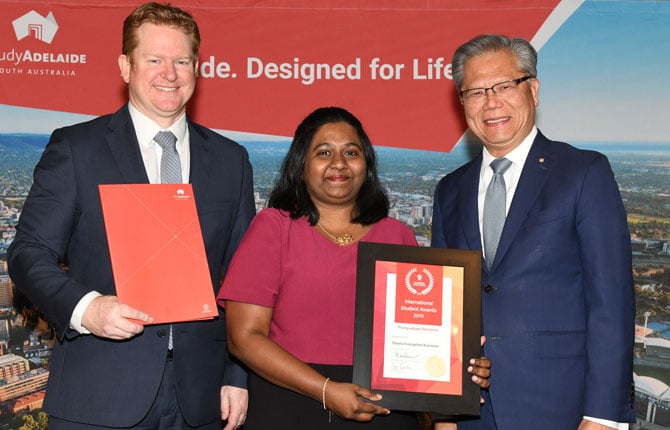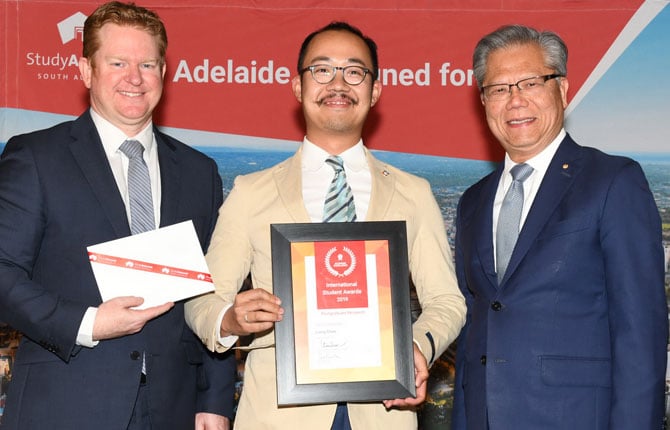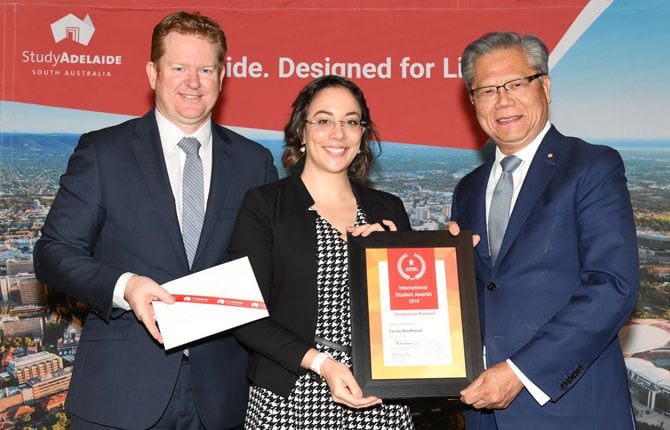
- Winner: Sheela Engaeline Kumaran, India, Flinders University
- Highly Commended: Liang Chen, China, The University of Adelaide
- Highly Commended: Carolin Reichherzer, Germany, University of South Australia
Winner: Sheela Evangeline Kumaran from India
Studying: PhD (Optometry, Public Health) at Flinders University
Arriving with a dream to continue her research on patient-reported outcomes, Sheela has excelled with several peer-reviewed publications, conference presentations and awards achieved during her PhD studies. Sheela says her Adelaide experience has been the perfect platform for her to propel her towards her goal of becoming an impactful researcher. It’s also been a wonderful experience for her family, welcoming their second child during their time in Adelaide.
What inspires your research?
While working as an optometrist in India, I was always interested in understanding the patient’s experience and how that correlated to their clinical results. Sometimes the patient didn’t feel a day-to-day improvement, even though their clinical outputs showed that. I was fascinated by the way patient experiences can be converted into measurable entities. Hence, I followed my passion to Adelaide where I’ve been fortunate to work on the latest advancements in patient-reported outcome measures.
Tell us more about your research collaborations between India and Australia.
In my research, I investigated the impact that amblyopia (lazy eyes) and strabismus (crossed eyes) have on the quality of life of adults living in Australian and India. As part of this, I established research collaborations in Australia and India and developed country-specific measurement systems in three languages (English, Hindi and Tamil).
What are your future goals?
My career goal is to establish myself as a health outcomes researcher and focus on improving the quality of life of people suffering from different illnesses. I’m grateful my PhD has nurtured me with the liberty to think, the boldness to pursue, the confidence to communicate, and the endurance to achieve.
You came to Adelaide with your husband and young son and had a baby this year. How have you found family life in Adelaide?
Coming to Adelaide was my first international travel for study. My son was only 2 years old at the time. Everyone said I should come here first and then bring my family once I was settled, but I didn’t want to leave them behind. My husband was very supportive, so we decided to move as a family.
Our transition to a new country was easier than we expected. We found a rental while we were still in India, so we moved into our home the day we arrived. Adelaide people are so friendly and kind. And we’ve found it to be a welcoming and nurturing environment for our son, who has now started school. We hardly knew anyone in the beginning, but now we have a whole community of true friends.
Flinders University has also been a great place to study. It’s very student-friendly, and my PhD supervisors have been extremely supportive and considerate, especially throughout my pregnancy. Adelaide is a wonderful study destination. The journey has been a pleasant one for both my family and my education.
Highly Commended: Liang Chen from China
Studying: PhD (Wine Chemistry) at The University of Adelaide

When Liang Chen decided to pursue his PhD in wine chemistry, he considered many wine regions around the world, including California, South Africa and France. But after speaking with researchers from the University of Adelaide, he knew he’d found the place for him. He says he had a good feeling about the work he could do, the people he could work with, and the lifestyle he could live in Adelaide. In 2018, Liang was the only University of Adelaide student to win a Nicolas Baudin travel grant. With the support of his PhD supervisor, he travelled to France to undertake a 6-month research program.
Now, 4 years after arriving in Adelaide, Liang is in the final stages of his PhD and preparing take up a postdoctoral position at the University of Bordeaux. Liang says the opportunity to work with world-famous wine chemists at the University of Adelaide, and the strong reputation Adelaide graduates have in the industry is what made it possible for him to take this next career step. ‘Thanks, Adelaide, for giving me the opportunity to learn knowledge, for offering the beautiful city to my hands and for building the confidence that I needed for my future.’
Highly Commended: Carolin Reichherzer from Germany
Studying: PhD (Computer Science) at the University of South Australia

Carolin Reichherzer believes now is the perfect time to be at the forefront of the applications of virtual reality (VR) technology. She says, ‘there is nothing more exciting than entering a field with a huge potential in society.’ And that is the crux of her PhD objective which is exploring how VR could be used in courtrooms to support members of the jury. Her research focuses on reconstructing the events of serious crimes in a VR world rather than sending the jury to the scene of the crime, sometimes many months or even years after it happened. Carolin’s PhD has been praised for its innovation, and she’s been invited to present her research to a group of judges for a discussion about how VR could realistically be brought into the Australian court system.
But it’s not been all study and research for Carolin in Adelaide. She’s also a co-founder of the Women in STEM student club at the University of South Australia, which invites all STEM students (both women and men) to participate in a variety of networking and mentoring opportunities. Carolin says she aims to be a role model for young women and to get more girls excited about careers in tech. She says her experience in Adelaide has changed how she approaches opportunities. ‘I used to shy away from openly speaking about myself and preferred to hide in my comfort zone. Now I see it as my responsibility to step up as another face for women in computer science.’
View all News


